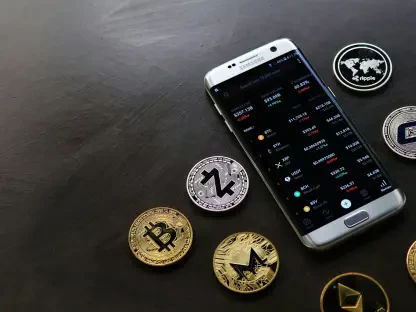What does it mean to shop online in a country where digital transactions are skyrocketing, yet over 80% of carts are abandoned before checkout? In Brazil, a nation at the forefront of e-commerce growth, this staggering statistic reveals a critical pain point that needs urgent attention. Enter Juspay, a trailblazer in payment technology, partnering with Mastercard to introduce Click to Pay—a solution promising to turn frustration into fluidity with a single click. This innovation isn’t just a tool; it’s a potential game-changer for millions of shoppers and merchants alike, redefining how transactions unfold in one of Latin America’s largest markets.
The importance of this development cannot be overstated. With a 7% surge in e-commerce transactions recorded in the first half of this year, Brazil’s digital economy is booming, yet the high rate of incomplete purchases threatens to derail this momentum. Juspay’s integration of Click to Pay addresses this head-on by slashing checkout friction and bolstering security, catering to approximately 129 million Mastercard users in the region. This story isn’t just about a new payment feature; it’s about reshaping trust, convenience, and efficiency in a market hungry for innovation.
A New Era for Digital Shoppers in Brazil
Picture the daily grind of online shopping: entering card details, fumbling through passwords, and second-guessing security with every transaction. For Brazilian consumers, this cumbersome process often leads to abandoned carts and lost opportunities. Juspay, in collaboration with Mastercard, is rolling out Click to Pay to flip this script, offering a streamlined checkout that prioritizes both speed and safety for a population increasingly reliant on digital platforms.
This service arrives at a pivotal moment. Brazil’s appetite for online shopping continues to grow, with millions turning to e-commerce for everything from essentials to luxury goods. Yet, the inefficiencies in payment systems have long been a barrier. By enabling users to link their Mastercard once and pay with a single click across participating merchants, this initiative promises to keep pace with consumer expectations, making every transaction feel effortless.
Beyond individual convenience, the ripple effect on the broader market is significant. As more shoppers complete their purchases without hesitation, merchants stand to see a surge in sales, while the overall trust in digital payments strengthens. This could mark the beginning of a more connected and confident e-commerce ecosystem in Brazil, driven by cutting-edge technology.
Why Brazil’s E-Commerce Surge Demands Solutions
Brazil’s digital payment landscape is a powerhouse, with transaction volumes climbing steadily and showing no signs of slowing from this year into 2027. However, beneath this growth lies a persistent challenge: cart abandonment rates exceeding 80%. This alarming figure points to deep-rooted issues in the checkout process, where complexity and security concerns deter consumers from sealing the deal.
The demand for innovation in this space is undeniable. As more Brazilians shop online, they expect transactions to be instantaneous and secure, mirroring the ease of in-person purchases. Traditional payment methods, often requiring multiple steps and manual input, fail to meet these modern standards, leaving both shoppers and merchants frustrated by lost opportunities.
Solutions like Click to Pay are not just timely—they’re essential. By addressing the friction points that drive abandonment, such technology can unlock the full potential of Brazil’s e-commerce boom. This shift isn’t merely about convenience; it’s about sustaining economic growth in a digital-first era where consumer patience for outdated systems is wearing thin.
Unpacking the Click to Pay Experience
At the heart of Juspay’s collaboration with Mastercard lies a meticulously designed system aimed at transforming online payments. Click to Pay allows Brazil’s 129 million Mastercard users to link their cards once, bypassing the repetitive task of entering details for every purchase. This one-click functionality, now among the first of its kind in Latin America, is a direct response to the inefficiencies plaguing digital checkouts.
Security remains a cornerstone of this innovation. With biometric authentication and issuer-verified credentials, every transaction is safeguarded against fraud, giving users confidence in their purchases. Juspay has also introduced Passkeys, an advanced layer of protection that further minimizes risks, ensuring that convenience doesn’t come at the expense of safety in a market where cyber threats loom large.
For merchants, the benefits are equally compelling. The plug-and-play integration simplifies adoption, cutting down on technical barriers and deployment time. Tokenized card credentials reduce fraud exposure, while the smoother checkout process drives higher conversion rates. This dual focus on consumer ease and merchant efficiency positions Click to Pay as a holistic solution for Brazil’s dynamic e-commerce challenges.
Leaders Weigh In on Payment Innovation
The impact of this partnership resonates strongly with industry pioneers driving the change. Leonardo Linares, Mastercard’s Senior Vice President of Client Solutions in Brazil, highlights the critical balance at play: “Collaborations with innovators like Juspay allow the delivery of technology that fuses security with simplicity, empowering consumers to transact without worry.” His words underscore a shared mission to elevate the payment experience.
Echoing this sentiment, Shakthidhar Bhaskar, Juspay’s Director of LATAM Expansion, views the initiative as a defining moment. “This marks a turning point in how payments are evolving in Brazil, aligning perfectly with the nation’s rapid shift to digital solutions,” Bhaskar notes. Such alignment reflects a deep understanding of local needs and a commitment to meeting them through forward-thinking technology.
These insights reveal more than just optimism; they signal a unified vision for the future. Both leaders recognize that transforming online transactions in Brazil isn’t a luxury but a necessity, especially as consumer expectations continue to rise. Their perspectives frame this rollout as a foundation for broader advancements in the region’s fintech landscape.
Real-World Benefits for Shoppers and Merchants
For the everyday Brazilian shopper, Click to Pay offers a tangible upgrade to online buying. Once a Mastercard is linked, payments across participating platforms become a single-click affair, backed by biometric security for added peace of mind. This eliminates the tedious steps that often derail purchases, making shopping as intuitive as it should be in a digital age.
Merchants, too, stand to gain immensely from this streamlined approach. By adopting Juspay’s integration, businesses can curb cart abandonment—a chronic issue in e-commerce—and build customer trust through secure transactions. The result is a potential uptick in sales, as smoother checkouts translate directly into completed orders, fostering loyalty in a competitive market.
Staying ahead in Brazil’s fast-moving digital economy means embracing such tools early. Retailers incorporating Click to Pay can position themselves as leaders, while consumers benefit from a growing network of frictionless shopping options. This practical framework illustrates how both sides can thrive in an environment increasingly defined by speed and reliability.
Reflecting on a Milestone in Digital Payments
Looking back, Juspay’s introduction of Mastercard’s Click to Pay in Brazil stood as a pivotal moment for the region’s e-commerce sector. It tackled entrenched issues like high cart abandonment with a solution that blended speed, security, and simplicity, setting a new standard for online transactions. The collaboration proved that innovation could bridge gaps in a market hungry for change.
For those navigating this evolving landscape, the next steps were clear: merchants needed to prioritize adopting such technologies to remain competitive, while consumers could seek out platforms offering this seamless checkout experience. Keeping an eye on expanding retailer participation was key to maximizing these benefits.
Beyond immediate actions, the broader implication was a call to continue pushing boundaries in fintech. As Brazil’s digital economy matured, sustained investment in user-centric solutions promised to deepen trust and drive growth. This milestone was not an endpoint but a springboard for future advancements in how payments were reimagined across Latin America.









